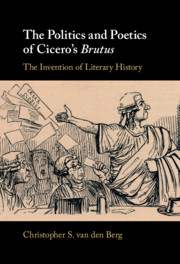Book contents
- The Politics and Poetics of Cicero’s Brutus
- The Politics and Poetics of Cicero’s Brutus
- Copyright page
- Dedication
- Contents
- Preface and Acknowledgments
- A Note on the Text
- Abbreviations
- Introduction
- Chapter 1 Ciceropaideia
- Chapter 2 The Intellectual Genealogy of the Brutus
- Chapter 3 Caesar and the Political Crisis
- Chapter 4 Truthmaking and the Past
- Chapter 5 Beginning (and) Literary History
- Chapter 6 Perfecting Literary History
- Chapter 7 Cicero’s Attici
- Chapter 8 Minerva, Venus, and Cicero’s Judgments on Caesar’s Style
- Conclusion
- References
- General Index
- Index Locorum
Chapter 2 - The Intellectual Genealogy of the Brutus
- The Politics and Poetics of Cicero’s Brutus
- The Politics and Poetics of Cicero’s Brutus
- Copyright page
- Dedication
- Contents
- Preface and Acknowledgments
- A Note on the Text
- Abbreviations
- Introduction
- Chapter 1 Ciceropaideia
- Chapter 2 The Intellectual Genealogy of the Brutus
- Chapter 3 Caesar and the Political Crisis
- Chapter 4 Truthmaking and the Past
- Chapter 5 Beginning (and) Literary History
- Chapter 6 Perfecting Literary History
- Chapter 7 Cicero’s Attici
- Chapter 8 Minerva, Venus, and Cicero’s Judgments on Caesar’s Style
- Conclusion
- References
- General Index
- Index Locorum
Summary
Chapter 2 focuses on the dialogue’s intellectual filiations. It begins by examining the preface’s (1–25) insistence on remaining silent about the civic crisis even as the interlocutors' exchange of written texts incessantly circles back to the accomplishments and struggles of the Roman state. Atticus’ Liber Annalis and Brutus’ de Virtute inspired the Brutus, but to what extent and to what purpose remains initially unclear. In aligning their texts with de Republica and the Brutus, Cicero creates a complex web of learned exchange in the service of the republic. The chapter then considers other potential intellectual predecessors: Varro’s writings on literature, the history of the dialogue genre, and Cicero’s own works. The Brutus draws together several intellectual currents and promises significant innovations in how to document and conceptualize the literary past.
- Type
- Chapter
- Information
- The Politics and Poetics of Cicero's BrutusThe Invention of Literary History, pp. 44 - 74Publisher: Cambridge University PressPrint publication year: 2021

